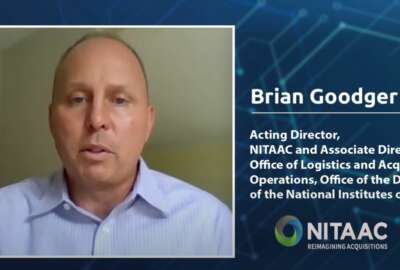Hubbard Radio Washington DC, LLC. All rights reserved. This website is not intended for users located within the European Economic Area.
The story of how one small business is barely hanging on to its hopes of winning a spot on NITAAC’s CIO-SP4
A recent change to the CIO-SP4 solicitation is forcing many small firms to change their bidding strategy at the last minute, leading to calls for NITAAC to paus...
The $50 billion IT services and software procurement known as CIO-SP4 reached new lows on July 19 with the National Institutes of Health IT Acquisition and Assessment Center (NITAAC) release of amendment seven.
Not only did the changes throw bidders into a new frenzy, but continued modifications to the rules to the small business teaming arrangements is putting the entire procurement at risk of collapsing under its own futility.
To understand just how problematic the changes brought on by amendment seven are, let’s look at a company, I’ll call Technology Company X (TCX). The real company agreed to share its story under condition of anonymity because it still plans to bid on the program and didn’t want to impact its relationship with NITAAC.
TCX is a small business, a CIO-SP3 contract holder and the person leading the bid effort, let’s call them Pat, has been in the federal market for more than 30 years. It’s clear, this isn’t someone or a company new to the market.
At the heart of the issue are changes in amendment seven that no longer lets small firms claim the experience of its large business subcontractors for points as part of the self-scoring evaluation.
Pat said TCX pulled two large businesses onto their team of small firms to help increase its total points. Out of a possible 10,000 points, TCX had more than 9,700 points before the amendment, meaning Pat felt TCX was in good shape to move into the second round of the competition.
When NITAAC released amendment seven and removed the ability of small firms to claim points from large business subcontractors, TCX’s self-score dropped to about 5,000.
“There was a clear implication from NITAAC that if you’re not over 9,000 points, you will not make the cut. It’s unclear where the cut is, so you’d be stupid not to compose your team of large and small contractors to maximize your points,” Pat said. “After amendment seven, our initial reaction was we are not sure we will make the cut. So we are now beating the bushes for small businesses who we can add to our team to get us back up to where we think the cut is going to be. The problem is we will wind up with a large unwieldy team if we have to add another 6 to 8 small businesses. Managing a team like that is another evaluation criteria, so we will also have to change our entire management approach. How do we make sure all the team members have reasonable access to task orders while making certain that we do 51% of all work?”
Why are all amendments on small business teaming?
Pat said it goes beyond the extra work of finding new teammates in the small amount of time NITAAC gave them until bids are due. The changes also impact TCX’s relationship with the large firms because they now have to ask them not to be on their CIO-SP4 team, which could harm their long-term teaming and partnering opportunities.
“The requirements are way out of line. NITAAC doesn’t seem to understand the burden these changes place on small businesses,” Pat said. “What is unique about CIO-SP4 is the focus on small business teaming. Why is every amendment focused on that and forcing everyone to do a joint venture? I think that was the underlying argument between the Small Business Administration and NITAAC that delayed the final solicitation.”
Pat said TCX spent more than $50,000 in proposal costs and employee hours working on this procurement.
TCX isn’t alone with this problem. Pat said they know of several other small firms which may not bid and/or file a protest with the Government Accountability Office.
In fact, NITAAC is facing a new bid protest that was filed July 22 by Pluribus Digital on this exact issue.
The company argues that amendment seven changes the way the agency will count only small business experience and the 14-day response is not sufficient for offerors to change their proposed teams.
Two other firms also have protests over CIO-SP4 before GAO.
On July 15, Tata American International Corp. filed a complaint arguing the information required to be submitted to show prior experience, especially in areas where the company has not performed for the government is confidential, and can’t be disclosed.
The third protest, which AgilisTek, LLC, filed on July 9 goes back to the previous changes to the solicitation regarding mentor-protégé arrangements and the ambiguities in the procurement itself.
Changes impact small, large businesses alike
Cy Alba, a partner with the law firm Piliero Mazza and who represented some of the companies that filed protests on July 2 only to have them be dismissed by GAO after NITAAC said it would take corrective action, said NITAAC’s amendment and change is causing two major problems.
“For small businesses, who cannot simply reform into joint ventures with large firms who are not their mentor because it would make the joint venture a large business, it is forcing them to ‘no-bid,’ wasting hundreds of thousands in bid and proposal dollars,” Alba said. “For large businesses though, it may have the same effect, in practice. This is because large businesses are also being prohibited from using subcontractors for numerous areas of the RFP. However, unlike small businesses, the large firms could create joint ventures, but the timing is the problem.”
Alba said the Defense Logistics Agency (DLA) is taking 20-to-30 days to issue CAGE codes to new entities, and NITAAC only gave firms an 11-day extension for the proposal due date.
“Even if they created a new JV immediately, they could not secure the CAGE code from DLA in time to bid,” he said. “So even large businesses are looking at major lost bid and proposal dollars. All-in-all, NITAAC’s last minute, capricious, change is costing companies millions of dollars at a time when dollars are stretched thin for so many, particularly the small business who likely had to forego other opportunities to take a shot at CIO-SP4. It is truly galling the total lack of understanding that NITAAC has as it seems they are not even aware of the time and expense companies put into these procurements or they just don’t care.”
A NITAAC spokeswoman declined to comment for the story, citing it’s an active procurement.
But Jim Williams, a former acting administrator of the General Services Administration and a senior executive who ran large procurements at the IRS and the Department of Homeland Security, said NITAAC absolutely should be discussing the changes and helping industry understand its thinking.
A growing call to pause the entire effort
Shane McCall, the managing partner of Koprince Law, said NITAAC needs to go back to the drawing board on this one. He is one of several experts calling on NITAAC to hit the pause button and relook at the entire procurement.
“While it may have been OK, although not the best for small businesses, for the CIO-SP4 solicitation to include this requirement, to change the ground rules this late in the game will leave a lot of small businesses out in the cold,” he said.
The Professional Services Council wrote a second letter to NITAAC and the Department of Health and Human Services on July 22 asking for a total reassessment of its approach “with the proper coverage for the business relationships and small business regulations,” and to issue a new, final amendment that gives bidders at least 30 days until proposals are due to ensure they have “sufficient, uninterrupted time to respond.”
“The latest amendment has frustrated many companies of all sizes. Given ever-changing proposal requirements and shifting timelines, PSC recommends a pause of the entire CIO-SP4 RFP,” said Stephanie Kostro, PSC’s executive vice president for policy. “Over the last 18 months, PSC has provided feedback to NITAAC on numerous occasions on needed clarifications of the CIO-SP4 RFP and the importance of adequate timelines for proposal submissions. The seven amendments published since late May have served to further compound industry concerns and have forced potential offerors to consider alternative strategies or decide not to bid on the CIO-SP4 opportunity at all. The additional two weeks provided by the most recent amendment for bid submission is insufficient for major overhauls of teaming arrangements. Such a brief extension reflects NITAAC’s disregard for or misunderstanding of how industry prepares teams and solutions in today’s government technology and professional services marketplace.”
In their 30 years in the market, Pat has rarely, possibly never, seen a procurement run so poorly as CIO-SP4. Pat said when an agency runs a procurement this big and this significant, the most important facet is transparency and consistency, and unfortunately, NITAAC hasn’t been very good at either.
Copyright © 2024 Federal News Network. All rights reserved. This website is not intended for users located within the European Economic Area.
Jason Miller
Jason Miller is executive editor of Federal News Network and directs news coverage on the people, policy and programs of the federal government.
Follow @jmillerWFED
Related Stories
Exclusive
Ask the CIO
Read more
NITAAC details timing, evaluation plans for $40B IT services contract
Related Stories
-
Frustrations over NITAAC’s $50B CIO-SP4 GWAC boiling over Contracts/Awards
-
NITAAC Contract Guide: CIO-SP4 Contracting





